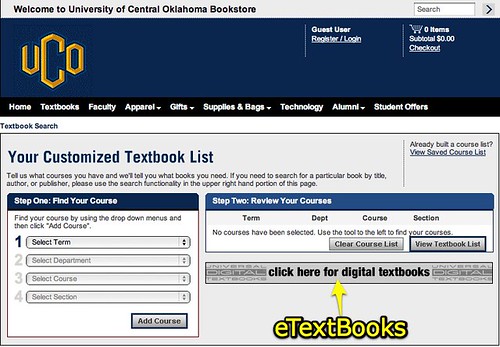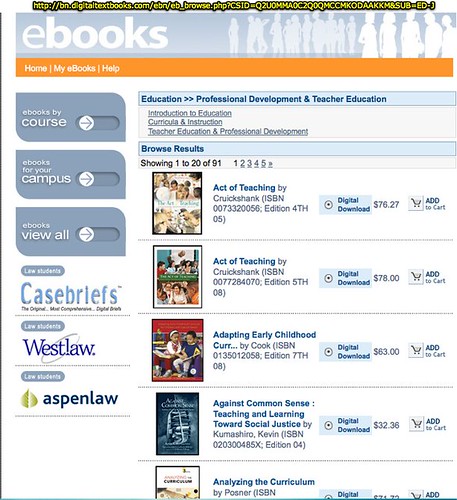This evening on the University of Central Oklahoma’s main announcements page on the faculty/staff/students portal, I noticed a message titled, “Textbook Rental Program Available Fall 2010.” It reads:
Beginning with the Fall 2010 semester, Central students will have the option of renting textbooks from the UCO Barnes and Noble Bookstore.
Students will have the option to rent 250 of the approximately 1,900 textbooks used at the university instead of buying the books and returning them later for possibly a partial refund.
Students will be able to rent textbooks in the store or online at http://uco.bncollege.com. Rented textbooks are due back to the bookstore no later than 10 days after the last day of finals.
For more information on the program, contact UCO’s Barnes and Noble Bookstore at 974-2736.
This option to “rent textbooks” is certainly intriguing, but I was even more interested in the link for “digital textbooks” on that UCO Barnes and Noble online bookstore page.
A search of the site reveals “no eBooks for your campus,” but perhaps none have been loaded into the system yet for the upcoming term. There ARE a wide variety of eTextbooks available on the site, however, so I clicked on those available for EDUCATION and “Professional Development & Teacher Education.”
These prices don’t seem steeply discounted to me. “Digital downloads” for $76.27, $78.00, and $63.00? Clearly this isn’t the Amazon.com store for Kindle eBooks. Textbook publishers continue to enjoy their controlling power over student and parent pocketbooks. Hopefully projects like Connexions at Rice University will change that soon.
On a personal note, it will be interesting to see where the curriculum I created for my two sections of “Technology 4 Teachers” this past semester at UCO takes me. It’s clear we NEED new curriculum for pre-service education teachers at UCO and other universities enrolled in “the required technology course.” It’s not clear to me what the best available / published source for that curriculum is today. I’m looking forward to a conversation over Skype this coming Thursday with several other professors / instructors of similar courses, to discuss our experiences and lessons learned. Assuming all goes well I’ll publish out the recording of that conversation as a podcast, and others may as well.
eBooks and eTextbooks SHOULD offer not only greater accessibility and functionality for students as well as instructors, they should also offer better VALUE. Apparently some textbook companies don’t “get” that idea yet. Perhaps it will take more professors and instructors writing and publishing openly licensed textbook materials, as some are doing through Flat World Knowledge and other digital publishers, to move this train.
Technorati Tags:
book, college, ebook, online, textbook, uco, university, bn, barnes, noble, rent, opencontent
If you enjoyed this post and found it useful, subscribe to Wes’ free newsletter. Check out Wes’ video tutorial library, “Playing with Media.” Information about more ways to learn with Dr. Wesley Fryer are available on wesfryer.com/after.
On this day..
- “PlanDemic” Disinformation Teachable Moment During COVID-19 – 2020
- Oklahoma Education Budget Cuts Affecting Classen School of Advanced Studies – 2016
- Configure Autoposting to a WordPress Blog from Emails via Posterous – 2011
- A few spots still open for Wednesday’s Google Docs Workshop (virtual & F2F) – 2011
- Pleased with VGA-out capabilities of PaperDesk LITE for iPad – 2010
- OU K-20 Center Supports Constructive WebCam Use in Oklahoma Schools – 2009
- Fire teachers at will legislation in Oklahoma vetoed by Oklahoma Governor Brad Henry – 2009
- New Macbook hard drive bliss – 2008
- links for 2008-05-09 – 2008
- iPhone disappearing photos workaround found! – 2008




Comments
One response to “Thinking today’s college eTextbooks are cheaper? Maybe not”
Wes,
Great article. At Miami University Career Services, we’re looking into converting our physical library into an e-library of sorts for career-related books. No EXACTLY what you’re referring to in this article, but close enough that I can hopefully offer a bit of information.
The e-book is in its infancy, catalyzed by the Kindle yet erupting into the public consciousness by Apple’s wonderful, though flawed, iPad. As a result, there’s a distinctive lack of standardization of format (i.e., Kindle’s proprietary format, e-Pub, Adobe Digital Editions (PDF), etc.). It seems as though e-Pub MAY win this battle, but the digital battlefield is still being drawn, pixel by pixel, so it’s still a bit early to tell.
This is a challenge.
Add to this, the ‘salon’ model of publishing whereby publishers set book prices rather than distributors, effectively murdering competition.
This is a challenge.
Finally, throw into this eclectic, binary soup the fact that there exists (to my knowledge) no simple, concise way to automate the code to produce the e-books. Take for example, the e-Pub format which is essentially an XHTML wrapper around the content. Automating the creation of that code would offer considerable savings, but current conversion methods are at best, ugly and clumsy, and at worst, unworkable. So what publishers save in printing costs is quickly consumed by coders, acting as new age printers using imaginary ink.
This is a challenge.
Where is it all going to land? Boy, I wish I knew. I am however certain of one thing: publishers have carefully scrutinized the shortcomings of the music industry and that organizations transformation to antiquity in the digital age. They will not make the same mistake, but instead, will unintentionally spawn the same digital black market.
I hope I added something to your post.
Highest regards,
Craig Michael Patrick
Marketing Coordinator
Miami University Career Services